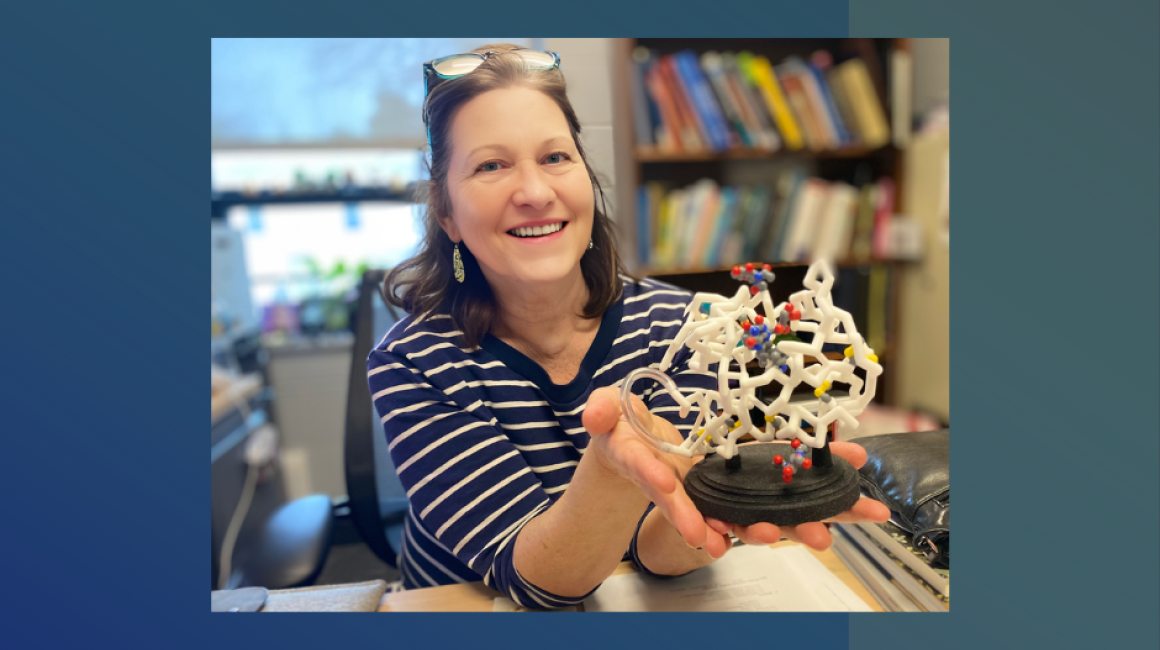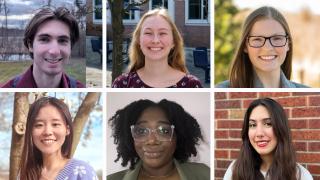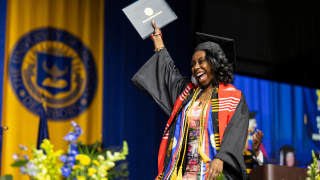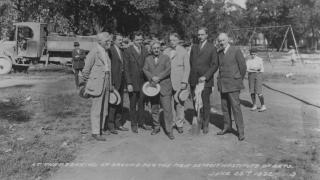
In Biochemistry Professor Marilee Benore’s office, there are custom printed 3D models of protein structures and copper pipes shaped and painted to look like DNA strands. Near these science sculptures, there are several whimsical pictures featuring the characters of Lewis Carroll’s “Alice’s Adventures in Wonderland.”
It seems like juxtaposition, but Benore says what they represent complements each other.
“Things are not always as they seem. When you look at me, you don’t see chromosomes, genes and proteins. But they are all there,” she said. “You can’t see anything in biochemistry with a naked eye. You have to believe it and be open to learning. That’s where these models come in. They introduce us to this world that’s under the surface.”
Listening to Benore talk with students about biochemistry substances and processes, it’s obvious that she values labs, practice-based learning, research work and those 3D models.
As she snaps a vitamin into an alpha ribbon niche on the protein model, Benore says many of her students go into medicine. She wants them to understand how things work so they can pass information along to others.
“I tell them, ‘Let’s pretend you are a physician and you have to tell a parent about a genetic disease. I want you to show me where the mutation might be on the chromosome and explain it to me,” she says. “When you are looking someone in the eyes and giving them news about something they cannot see, you need to be more than a doctor. You need to be a trusted source and educator.”
Benore has taught at UM-Dearborn since 1989, and she explores different ways to educate her students. That has built trust. Just a few examples, among many: Benore mentors scores of students in her lab, and she is organizing a study abroad experience to Italy for students to learn from an ancient medicinal garden, and she created custom take-home lab kits for students during the pandemic.
For her work, Benore was named a 2023 Fellow by the American Society for Biochemistry and Molecular Biology. The honorific program recognizes 20 scientists annually who’ve made outstanding contributions to the field through their research, teaching, mentoring or other forms of service. She was named along with faculty from institutions that include U-M Medical School, Yale, UC-Berkley and Rutgers.
“Because biochemistry is considered challenging to teach, biochem educators have ways — like the ASBMB — to collaborate with leaders in the field and make sure that our lessons remain relevant and student-centered,” said Benore, who’s been a member of the society for 20-plus years. “A recognition like this means my work is appreciated, has value and it opens doors.”
Benore said the ASBMB supports innovative science education and promotes the diversity of individuals entering the scientific workforce — something she’s passionate about.
As a young chemical lab researcher in industry, Benore experienced harassment and discrimination from male colleagues. And when she graduated with an advanced degree in chemistry at the University of Delaware, she was in a class with only four females. “In my journey, I’ve learned that opportunity doesn't exist for everyone. I wanted to ensure that girls and women had access to STEM careers.”
Before Benore was a professor, she was a girls’ basketball coach, a feminist newsletter editor and a domestic violence shelter advocate. As a professor, Benore organized and ran a Girl Scouts STEM summer camp, advised the UM-Dearborn chapter of Women in Leadership and Learning and team-taught with colleagues in the Women and Gender Studies program.






